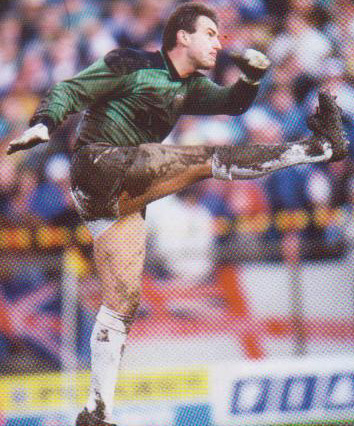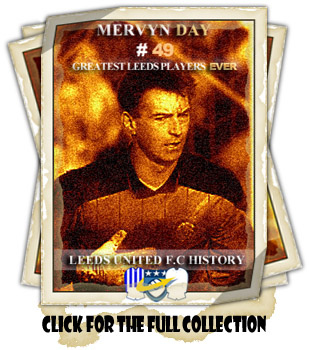

Day: Mervyn Richard (Mervyn)
1985-1993
(Player Details)
Goalkeeper
Born: Chelmsford, Essex: 26-06-1955
Debut v Oldham Athletic (a): 02-02-1985
6’2” 15st 1lb (1987)
#49 in 100 Greatest LUFC Players Ever

The young Mervyn Day soon found that he had a natural ability when standing between the
sticks. He represented Essex Schools at all levels and was even picked for the England
Schools squad six times, though he never got to see action. By the age of fifteen the word
had spread that there was a young man worth watching and Ipswich, Spurs and West Ham
dispatched scouts to investigate. Ron Greenwood's West Ham impressed Day most and he had
no hesitation in signing youth forms in July 1971. February 1973 brought a full contract
offer and a move up to the first team, as third choice keeper. Day's full League debut
came at the tender age of seventeen on 29th August 1973, in a 3-3 home draw against
Ipswich. It wasn't long before Day became a first team regular, and went on to appear in a
2-0 FA Cup final win over Fulham in 1975. Aged nineteen he became the youngest Cup-Final
goalkeeper ever, and was voted Young Player of the Year that same season. He then turned
out in a packed Heysel Stadium in 1976 to appear in the Cup Winners Cup Final - losing 4-2
to Anderlecht. The sky was the limit. Unfortunately, the Upton Park dream began to turn
into a nightmare. The Hammers' fans began to turn against him and the pressure started
getting to the keeper. The news, in February 1979, that Phil Parkes was to sign for West
Ham was the final straw for Day and he requested a transfer, completing a move to Second
Division Leyton Orient in July 1979 for £100,000 after One hundred and ninety-four League
appearances, fourteen each in the F.A. Cup and League Cup, nine in the European
Cup-Winners' Cup, two in the Anglo-Italian Cup, three in the Texaco Cup and one in the
Charity Shield, a total of two hundred and thirty-seven matches for West Ham. Four years
at Brisbane Road saw Day play some of the best football of his career, culminating in some
rave reviews and a move to high fliers Aston Villa in August 1983 for £15,000, after one
hundred and seventy games in the League. He managed only thirty starts at Villa before
Eddie Gray took him to Leeds in January 1985 for £30,000. He was a key figure in United’s
1987 F.A. Cup run to the semi-finals and passed his six hundred League appearance mark on
his way to a Second Division Championship medal in 1989-90, when he was voted Leeds
“Player of the Year”. Day went on to make two hundred and twenty-seven League appearances,
hardly missing a game but after helping the Yorkshire club back into the First Division in
1989/90, in 1990/91, at the age of thirty-five, Day realised his playing days were coming
to an end. He became second choice after the purchase of John Lukic and was offered the
post as goalkeeping coach, under Howard Wilkinson, for the memorable Premiership Championship
winning season of 91/92. Day took this post, but after loan spells with Coventry City in
1990, Luton Town, where he payed four League game, in March 1992 and Sheffield United, where
he had one League game, in May 1992, he found the offer of more responsibility, as assistant
coach at Carlisle United, made by Mick Wadsworth in June 1993, one that he could not resist.
The Wadsworth/Day partnership took Carlisle to Wembley in the Auto-Windscreens Shield Final
in 1995 and won the Third Division Championship in style the same year. Day slotted in well
and was instrumental in all the good things that came Carlisle's way during that period.
Just eight months after the dramatic and historic Wembley appearance the partnership was
broken and Day found himself in charge of a team struggling to find its way in Division Two.
He had twenty-one games to save their status and nearly achieved just that, missing out
agonizingly on the last day of the season. Six games into the 1997/98 season brought a
decision that both angered and bemused the Carlisle public. Chairman Knighton held a four
hour board meeting on the 11th September 1997 and took the decision to sack Day with
immediate effect. The man who had been heralded as one of the brightest young management
prospects in the country was shown the door, for reasons that still remain unclear. Day,
to his credit, has resisted the temptation to speak out and all that remains for Carlisle
fans is to wonder where a man with undoubted motivational and managerial qualities could
have taken the club. Charlton Athletic wasted no time in recruiting Day and he worked
alongside Alan Curbishley as assistant coach for the Premiership outfit for several years.
After Curbishley decided to leave Charlton, he rejoined him as Assistant Manager in December
2006 at West Ham United. They both left the club in September 2008. He was appointed chief
scout at Elland Road on 20th July 2010. Day’s son Richard, a midfielder with Yorkshire
Amateurs and Leeds City Boys signed associate schoolboy forms with Leeds in April 1994.